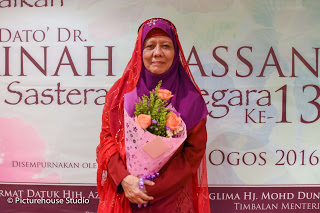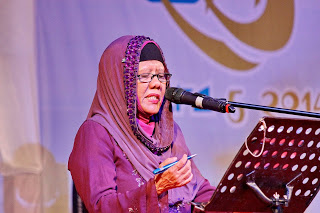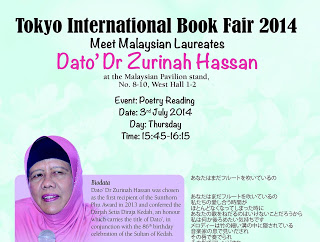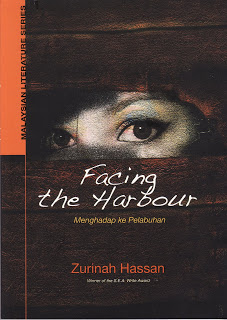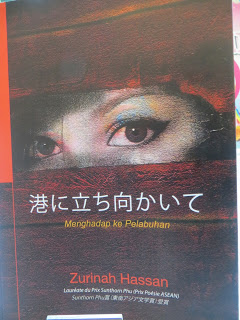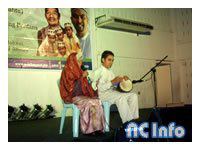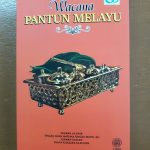COLLECTION
OF POETRY
OF POETRY
1974. Sesayup Jalan. (The Long Journey) Pulau
Pinang: Publication Bureai, USM.
Pinang: Publication Bureai, USM.
1977. Di Sini Tiada Perhentian.(No Stopping
Here) Kuala Lumpur: Pewarna.
Here) Kuala Lumpur: Pewarna.
1985 Keberangkatan (Departure). Kuala Lumpur: Dewan Bahasa dan
Pustaka.
Pustaka.
1988 Kuala Lumpur and Other Places,Penerbitan
Al-Huda.
Al-Huda.
1994 Pujangga Tidak Bernama. (Unknown Poet), Kuala Lumpur: Dewan Bahasa dan Pustaka.
2004 Pesanan dari Gunung Ledang (A Message
from Mount Ledang), Kuala Lumpur: Dewan
Bahasa dan Pustaka.
from Mount Ledang), Kuala Lumpur: Dewan
Bahasa dan Pustaka.
2005 Salasilah (Ancestral line). Kuala Lumpur: Dewan Bahasa dan
Pustaka.
Pustaka.
2014 Cerita dalam Cerita. (The inside story)Kuala Lumpur: Institut
Terjemahan dan Buku Malaysia.
Terjemahan dan Buku Malaysia.
2000. Nota Waktu (Time Notes, with Lim Swee Tin). Kuala Lumpur: Citra
Publishing Sdn. Bhd.
Publishing Sdn. Bhd.
TRANSLATIONS
The work of Zurinah Hassan (poetry and short story) have
been translated into several languages including English, Tamil, Mandarin,
Spanish, Russian, French, Japanese and Thai.
Some notable works are:
been translated into several languages including English, Tamil, Mandarin,
Spanish, Russian, French, Japanese and Thai.
Some notable works are:
2010. Facing the Harbour /Menghadap ke
Pelabuhan. Kuala Lumpur:Malaysian Institute of Translations and Books. (
translations into English by the poet).
Pelabuhan. Kuala Lumpur:Malaysian Institute of Translations and Books. (
translations into English by the poet).
2012 Menghadap ke
Pelabuhan/Frente al Puerto. Kuala
Lumpur: Malaysian Institute of Translations and Books, (translation into Spanish
by Patricia Vazquez Marin)
Pelabuhan/Frente al Puerto. Kuala
Lumpur: Malaysian Institute of Translations and Books, (translation into Spanish
by Patricia Vazquez Marin)
2012 Menghadap ke
Pelabuhan/ Глядя на гавань, Kuala Lumpur: Malaysian Institute of
Translations and Books, (translation into Russian by Victor Pogadeav)
Pelabuhan/ Глядя на гавань, Kuala Lumpur: Malaysian Institute of
Translations and Books, (translation into Russian by Victor Pogadeav)
2015 Menghadap Ke
Pelabuhan/En Regardant Le Port, Paris: L’Harmattan and Malaysian Institute of Translations and Books.
(translation into French by Jean Severy).
Pelabuhan/En Regardant Le Port, Paris: L’Harmattan and Malaysian Institute of Translations and Books.
(translation into French by Jean Severy).
2016 short story “Bendang Lahuma” (Lahuma Padi Field) in an
anthology Miniatures, Nouvwelles de
Malaisie, Paris Magellan &CIE and Malaysian Institute of Translations
and Books
anthology Miniatures, Nouvwelles de
Malaisie, Paris Magellan &CIE and Malaysian Institute of Translations
and Books
1993, short story “Nenek” (Grandmother) in Antologi Cerpen
Penulis Wanita Malaysia, Xiandai Publication, China, (translation into
Mandarin)
Penulis Wanita Malaysia, Xiandai Publication, China, (translation into
Mandarin)
2014, cerpen “Kerongsang Berlian Wan Tempawan” (Wan
Tempawan Diamond Brooch) in Antologi
Cerpen: Malaysia-Taiwan, Malaysian Institute of Translations and Books and Taipei Chinese Centre Pen International (translation
into Mandarin .
Tempawan Diamond Brooch) in Antologi
Cerpen: Malaysia-Taiwan, Malaysian Institute of Translations and Books and Taipei Chinese Centre Pen International (translation
into Mandarin .
2016 Poetry “Puisi
Cinta yang Lain” , Anthology in
conjunction with India-Malaysia Writers Meet, 2016 (translated into Tamil)
Cinta yang Lain” , Anthology in
conjunction with India-Malaysia Writers Meet, 2016 (translated into Tamil)
COLLECTION OF SHORT
STORIES
1989. Meneruskan Perjalanan, (Going On) Kuala
Lumpur: Dewan Bahasa dan Pustaka.
Lumpur: Dewan Bahasa dan Pustaka.
2004. Menjelang Pemilihan (Election Soon), Kuala
Lumpur: Dewan Bahasa dan Pustaka.
Lumpur: Dewan Bahasa dan Pustaka.
2016, Murka Lautan (The Wrath of The Ocean),
Kuala Lumpur, Institute of Translation and Books.
Kuala Lumpur, Institute of Translation and Books.
NOVEL
1991. Hatimu Aisyah. (The Story of Aisyah), Kuala Lumpur: Dewan
Bahasa dan Pustaka.
Bahasa dan Pustaka.
OTHER BOOKS ( LITERARY STUDIES AND NON CREATIVE)
1996. Sasterawan Negara Usman Awang. (Usman Awang, the Literary Laureate). Kuala
Lumpur: Dewan Bahasa dan Pustaka.
Lumpur: Dewan Bahasa dan Pustaka.
2003. Memoir
Zurinah Hassan Menjejak Puisi. (Memoir
of Zurinah Hassan Journey in Poetry), Bangi: Penerbit UKM.
Zurinah Hassan Menjejak Puisi. (Memoir
of Zurinah Hassan Journey in Poetry), Bangi: Penerbit UKM.
2010. Unsur
Alam dalam Puisi Melayu. (Nature in
Malay Poetry), Bangi: Penerbit UKM.
Alam dalam Puisi Melayu. (Nature in
Malay Poetry), Bangi: Penerbit UKM.
2011. Puisi
Melayu Tradisional-Pantun, Syair, Gurindam, Nazam, Seloka. ( Traditional Malay Poetry)Pekan Ilmu.
Melayu Tradisional-Pantun, Syair, Gurindam, Nazam, Seloka. ( Traditional Malay Poetry)Pekan Ilmu.
2013. Catatan Perjalanan Seni Zurinah Hassan.(
The Pessage Through Arts) Kuala Lumpur: Institut Terjemahan dan Buku Malaysia.
The Pessage Through Arts) Kuala Lumpur: Institut Terjemahan dan Buku Malaysia.
QUOTING WHAT OTHERS SAY ABOUT ZURINAH HASSAN.
Muhammad
Haji Salleh, in An Anthology Of
Contemporary Malaysian Literature, 1988, Kuala Lumpur, Dewan Bahasa Dan
Pustaka : 362 described Zurinah Hassan as an individualist based on her poems
in seventies.
Haji Salleh, in An Anthology Of
Contemporary Malaysian Literature, 1988, Kuala Lumpur, Dewan Bahasa Dan
Pustaka : 362 described Zurinah Hassan as an individualist based on her poems
in seventies.
Muhammad
said, “A further illustration of this individualism comes from the works of a
woman poet, Zurinah Hassan. Her poems not only show that she is a different
woman from other woman writers but also a person who finds in poetry the
opportunity to speak out her inner most
soul without the decorum of the past literary practices.
said, “A further illustration of this individualism comes from the works of a
woman poet, Zurinah Hassan. Her poems not only show that she is a different
woman from other woman writers but also a person who finds in poetry the
opportunity to speak out her inner most
soul without the decorum of the past literary practices.
Although
Malaysian literature does not discriminate against women poets, because of
certain attitudes of propriety and femininity, the really vocal and individual
woman poet is a rare person. Zurinah Hassan is a poet who does not shy away
from the personal problems in poetry. Unlike traditional poets, her style is
direct and she is her own theme. The woman alone, through Zurinah, has never before been dealt with in
such terms or put in her uncompromising reality.
Malaysian literature does not discriminate against women poets, because of
certain attitudes of propriety and femininity, the really vocal and individual
woman poet is a rare person. Zurinah Hassan is a poet who does not shy away
from the personal problems in poetry. Unlike traditional poets, her style is
direct and she is her own theme. The woman alone, through Zurinah, has never before been dealt with in
such terms or put in her uncompromising reality.
Let us
look at a short poem as a start to see how the poet sees herself
look at a short poem as a start to see how the poet sees herself
Now I am a mad actress
on an empty stage
on an empty stage
The curtain has
fallen
fallen
And the audience have
all gone
all gone
But I am still acting
uttering my favourite
lines
lines
“God, thank you god
O, thank you god
For giving me
everything
everything
Except the one I
desired most”
desired most”
I see
this poem as a statement of a lonely young woman facing a loveless life- a
topic that is shied away from in Malaysia, and discussed done so only very indirectly.
Zurinah includes no self pity or
sentiments for effects. On the contrary it is stated in the staccato sounds of
the brutal absurdity of her existence, she allows herself to judge objectively.
This she does by comparing herself to a mad actress who acts out a life on an
empty stage without an audience. In a very intense moments of absurdity.
Absurdity in this form is very novel to Malaysia and in its freshness strikes
hard at the old world-views.
this poem as a statement of a lonely young woman facing a loveless life- a
topic that is shied away from in Malaysia, and discussed done so only very indirectly.
Zurinah includes no self pity or
sentiments for effects. On the contrary it is stated in the staccato sounds of
the brutal absurdity of her existence, she allows herself to judge objectively.
This she does by comparing herself to a mad actress who acts out a life on an
empty stage without an audience. In a very intense moments of absurdity.
Absurdity in this form is very novel to Malaysia and in its freshness strikes
hard at the old world-views.
Like Latiff
Mohidin and Baha Zain, Zurinah Hassan too illustrated these aspects of this new
individualism that perhaps come from a university education, a changed
environment, new personal and moral values. Zurinah as a contemporary woman finds that she
must hear her own inner voice and a poet must record it as truthfully as possible.
Even though times have changed, to be this truthful is to be a courageous
woman, both intellectually and morally. She needs freedom in order to be this
courageous.
Mohidin and Baha Zain, Zurinah Hassan too illustrated these aspects of this new
individualism that perhaps come from a university education, a changed
environment, new personal and moral values. Zurinah as a contemporary woman finds that she
must hear her own inner voice and a poet must record it as truthfully as possible.
Even though times have changed, to be this truthful is to be a courageous
woman, both intellectually and morally. She needs freedom in order to be this
courageous.
While the air is for
one moment light
one moment light
at another moment heavy
Space is for one moment
laden
laden
And another moment
empty
empty
A bird in the mud lifts
its trapped wings
its trapped wings
Trying to be free.
The
poem is called “Dalam Mencari kebebasan (To Be Free). It parallels the
predicament of a woman to be herself in a society that is not ready for her.
poem is called “Dalam Mencari kebebasan (To Be Free). It parallels the
predicament of a woman to be herself in a society that is not ready for her.
Sasterawan
Negara, Literature Laureate Usman Awang talked about significant contribution
of Zurinah Hassan, In an Interview With The Star, The Star, Thursday Jun 30, 1988.
Negara, Literature Laureate Usman Awang talked about significant contribution
of Zurinah Hassan, In an Interview With The Star, The Star, Thursday Jun 30, 1988.
Zurinah
Hassan has made a significant contribution to Malay literary development. She
brings meaning to the Malay language, breathes life into her words. Her use of
language is captivating, poetic and harmonious. Some of her poems I’ve noticed
are cynical, satires about men based on
her experience.
Hassan has made a significant contribution to Malay literary development. She
brings meaning to the Malay language, breathes life into her words. Her use of
language is captivating, poetic and harmonious. Some of her poems I’ve noticed
are cynical, satires about men based on
her experience.
One of
her poems in particular had large impact on Usman . He remembers that it was a
message to children which read, “Do not forget there is always god. For you
will need him one day particularly when you are born a woman. I will always
remember that poignant line. It reveals
the problem and sufferings of a woman trying to survive in a man’s world”
her poems in particular had large impact on Usman . He remembers that it was a
message to children which read, “Do not forget there is always god. For you
will need him one day particularly when you are born a woman. I will always
remember that poignant line. It reveals
the problem and sufferings of a woman trying to survive in a man’s world”

